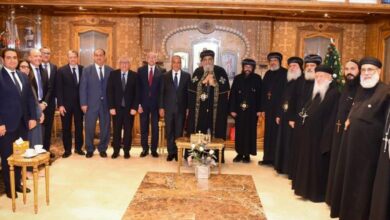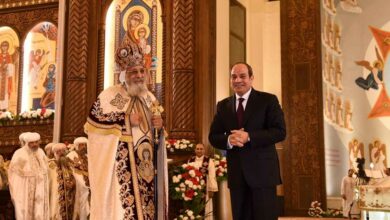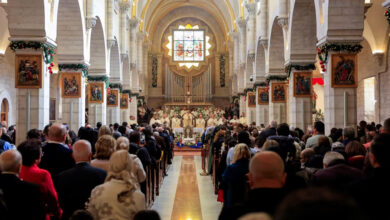Abdel-Hafeez crouched on his two-step ladder, strategically pasting swathes of cotton balls around interlocking glittery Christmas decorations on his gingerbread house replica kiosk. A Russian tourist in flowery shorts and a T-shirt walked by. Abdel-Hafeez was setting up a promotional cookie stand for the hotel he works in at Sharm el Sheikh’s Naema Bay. “It’s for Christmas, something for the tourists. They like these things, they don’t want to feel like they missed out on their Christmas completely.”
Hotels and touristic outlets have long celebrated Christmas for tourism-related reasons. However, over the past few years, the holiday has been visibly gaining ground throughout various strata of Egyptian society.
Around 10 December, the Christmas buzz starts to hit with displays popping up in almost every major Cairo mall. Banners with “Merry Christmas and Happy New Year” adorn different store and restaurant fronts, and it becomes all too evident that the consumer fever that hits many other parts of the world has caught on here this year too.
Some reports say that around 500,000 Christmas trees will have been sold this year in Egypt by 25 December–a large number considering how many Egyptians observe Christmas as part of their religion.
The Coptic Catholic Church, which celebrates 25 December, has around 200,000 adherents only. Over 95% of Egypt’s large and observant Christian population are Orthodox Coptic, and celebrate Christmas on 7 January. An Orthodox Coptic Christmas is also distinctly void of reindeer, evergreen trees, and carols about Santa coming down Cairene chimneys.
Christmas in Egypt has departed from its roots as a celebration of the birth of Christ and taken on a more social role, with many Muslims and Christians–especially in the more affluent communities–celebrating it without really observing it.
“I have been invited to at least four Christmas parties this year, and three of them are being held by Muslims. This is the first time I've felt such a huge emphasis on Christmas,” 33-year-old investment banker Osama Abdelshafy said.
Rania El-Nazer, who works in PR and is herself throwing a Christmas party, says she will fill her house with Christmas decorations and have everyone exchange gifts. “It’s not about being Christian or not, I just like the idea of getting together and giving gifts in a festive atmosphere.” Rania’s guests–although of both religious persuasions–include no one who will attend Christmas mass–or "Christ’s Mass", where the holiday’s etymology comes from.
Despite it commercially overshadowing Coptic Christmas–religiously observed by over 8 million Egyptians–the Coptic Church never really voiced any concern. “It is not as big of a holiday for us as Easter anyway,” said Ramez Kaldas, a Copt who will be attending Rania’s party. “In fact it’s kind of nice because it sort of marks the beginning of the celebrations for us. It’s the last two weeks of our fasting (for Advent) before 7 January. Some of the more conservative priests do not like us celebrating 25 December. But for the most part, not much of a fuss is made.”
For some Egyptians the celebration takes on a much more traditional function. “Despite having been in Egypt for three generations, my mother’s side has Italian Roman Catholic roots. They always celebrated Christmas traditionally since coming from Italy. Now we continue celebrating it as one of the occasions that bring the family together,” 27-year-old artist Essam Abdullah said.
The celebration of Christmas has always existed as part of Egypt’s heritage, according to Dr. Reem Saad, a professor of social anthropology at AUC. “People in Egypt have traditionally celebrated religious diversity and joined each other in their celebrations. It has been a mainstay of Egyptian culture in the past,” she said.
She thinks that the manifestation of Christmas in a secularized way in houses that do not observe it religiously stems from the love Egyptians have for festive environments. “Egypt as a society likes festive occasions. Christmas falls at the same time as the winter (mid-year) breaks that end with 7 January celebrations. Although we can’t forget how small a subsection of Egyptian society actually celebrates it.”
Saad does not think the consumer frenzy that happens in Europe and the US has taken over Egypt’s Christmas. “Lately it has taken more of an open consumerist shape, but thankfully it has not yet reached the vulgar, worn-out level of occasions like Valentine’s Day. Christmas is still light on us, thank God.”
Many consumer and touristic outlets, however, use the season in any way possible to incite consumerism. “Of course Christmas decorations make people happy and put them in a better mood to shop. Plus, everyone knows about Christmas in the west because of television, so it might encourage them to buy gifts and frequent the malls because of the cheerful atmosphere,” Maged, a marketing consultant who works with consumer outlets and malls, said.
Some other Arab countries have reached vulgar degrees of Christmastime consumerism. Abu Dhabi hosts the world’s most expensive Christmas tree, standing at $11million in one of its glitzy hotels.
Saad thinks that Egypt is still at a stage where Christmas is just a festive time, and although having an impact on a social-religious level, it cannot be considered as having any profound effect on consumer patterns or modes of life. “Egyptians don’t all have religious reasons to celebrate it, but everyone is looking for excuses to be cheerful.”




